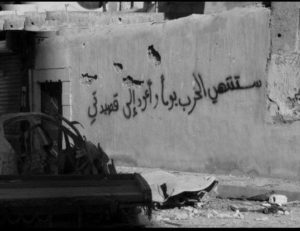Ayesha Ahmad
‘Daughters of Rabia’ is a social media blog with over 50,000 viewers a week. The blog is a dashboard containing narratives of different forms – poems, essays, and short stories – from women, and sometimes men, in Afghanistan about the challenges they face often in the shadows of being silenced and shielded from the view of the rest of the world.
Each word is an act of protest; an echo of resistance and a triumph of knowledge that although voices may be quiet, the mind is alive and speaking out against injustice and violence towards the body as well as towards the spirit of humanity.
The question I ask here, then, is why is writing as a form of protest remaining such a strong tradition in our global culture?
The below image details an inscription, or rather, the signature of a determined artist to finish their poem once the war ends.

“When this war ends, I will return to my poem”
I think that our stories are our hope. If we can create our words during a time of destruction or decay or death either in terms of an ill society or an ill body, then there is a pathway to a legacy.
Should we make a parallel between words dying or our bodies dying and the words we convey during illness, perhaps there is a sense that words signal our breath; the stories that become of our words are the times that our hearts have beaten through our tales; our traumas.
It would be hopeful for medical and health professionals to relate to the initiative of writing as a form of protest. Sometimes silence reaches the most deep of wounds, and when such silence emerges as a voice, there is a power, a blood in the veins of all the intricate ways in which we, and our sufferings, are connected.
Daughters of Rabia (Persian): in English, Free Women Writers: http://www.freewomenwriters.org/afghan-women-write-threats/